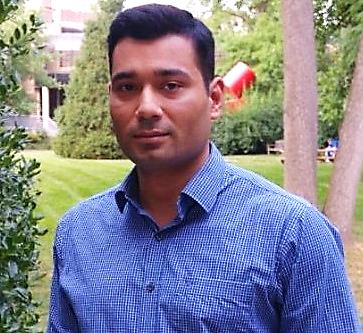
Trainee Spotlight: Vivek Modi, PhD
-
Vivek Modi, PhD

Postdoctoral Associate
Dr. Roland Dunbrack’s lab
Fox Chase Cancer Center
[email protected]Biography
I still remember reading The Journey to the Center of the Earth by Jules Verne, one of the first books I got from my middle school library. Surprisingly, it was not the science, but rather the sense of wonder which captured my imagination as a child. I will forever be smitten by that sense of wonder, which now as an adult, drives me to explore new ideas in science. I grew up in Jaipur, Rajasthan, a desert state in the northwestern part of India. During my school days, Physics and Mathematics were among my favorite subjects and I dreamed of studying astronomy. However, I pursued a Bachelor of Engineering in Biotechnology from Rajasthan University, which exposed me to a wider number of subjects, becoming a lifelong foundation for my interest in inter-disciplinary research. While I was in the initial years of my undergraduate degree, I already knew that I was going to pursue theoretical work in my research career. My graduate work was done at Indian Institute of Technology (IITK), Kanpur in the area of Computational Structural Biology. My advisor Dr R. Sankar taught me everything from the method of science to science ethics and solidified my interest in academics. The current phase of my career began serendipitously when I met Dr. Roland Dunbrack in India. I became his tour guide and we spoke about everything from culture and history, to science, which led to me becoming a postdoc in his lab in December 2013. Since then I have primarily worked on two projects: assessment of protein folding and refinement programs in CASP11, a community experiment focused on protein structure prediction; and structural bioinformatics analysis of protein kinases to understand their conformational diversity. In future I will extend my work on kinases by doing molecular dynamics simulations to explore their dynamic nature and inhibitor binding.
Research Overview
Molecular modeling uses theoretical methods to derive and mimic the structural properties of molecules (proteins in our case). This ability to model proteins promotes our understanding of protein structure-function relationship, drug design and the effects of mutations. A large number of algorithms have been developed by different groups to predict and refine the 3D-structure of a protein from its amino acid sequence. Every two years, a community-based experiment called CASP (Critical Assessment of Protein Structure Prediction) is held in which research groups submit structure predictions for a designated list of targets without any knowledge of their native/experimental structure. In 2014, our research group was chosen to be the expert assessors for CASP11 and our job was to compare the accuracy of different protein structure prediction and refinement programs.
One of the prominent methods of structure prediction is modeling the unknown structure based on the structure of a known protein homolog (referred to as the template). In our first assessment, we evaluated the predictions generated through template-based modeling; we observed that a relative few submitted models were close to the native structure of the protein. Moreover, most of the predictions were dissimilar, not only to the native structure but also among the predictions (referred to a bimodal distribution). This finding was important since current assessment methods are based on the assumption that most of the predictions are structurally close to each other (unimodal). In our second assessment, we analyzed the refinement of the predicted structures and introduced new methods of relative scoring and visualizing the closeness of the predicted structure to the native protein. Our work examines the accuracy of current methods and guides the development of better algorithms for protein structure prediction. .
Featured publications
Vivek Modi and Roland Dunbrack Jr. (2016), Assessment of refinement of template-based models in CASP11. Proteins. doi:10.1002/prot.25048
Vivek Modi, Qifang Xu, Sam Adhikari and Roland Dunbrack Jr. (2016), Assessment of template-based modeling of protein structure in CASP11. Proteins. doi:10.1002/prot.25049
